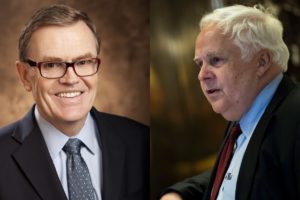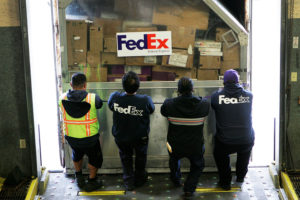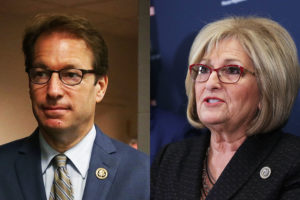Above: Top: Photo by Chris Hondros/Getty Images; Bottom: Photo by Scott Olson/Getty Images

FedEx, UPS Push for Tax Cuts As Documents Show Them Sinking Millions Into Automation
FedEx and UPS—two of America’s biggest employers—have been publicly pushing tax cuts as job creators even as they plan to spend hundreds of millions of dollars for a coming wave of automation at their distribution centers and along their delivery lines, corporate documents show.
Left: UPS CEO David Abney (Photo via UPS.com); Right: FedEx CEO Fred Smith (Photo by Drew Angerer/Getty Images)
VIDEO: FedEx & UPS: Pushing Tax Cuts In the Name of Job Creation, While Automating Everything Possible

UPS, FedEx Investing in Drones While Pushing Tax Cuts as Job Creators
Twenty-one patent filings, along with other documents reviewed by TYT, show that FedEx and UPS are actively investing in drones and driverless vehicles—which some analysts estimate could cost thousands of jobs—even as both companies lobby for corporate tax cuts they say will create jobs.
One official involved in research for FedEx told TYT that the industry is looking at drones for more than just deliveries to unusual locales, but as a future “staple” of urban delivery, as well.
Image via ups.com
VIDEO: The REAL Reason FedEx And UPS Are Fighting For Tax Cuts

Trump Promises Truckers Jobs from Tax Cuts, as UPS Invests in Outsourcing Trucking Jobs
As President Trump prepared to pitch the job-creating effects of his proposed tax cuts Wednesday night to hundreds of truckers at a speech in Harrisburg, PA, a representative for a truckers’ union group told TYT the Teamsters are gearing up for a contract battle with UPS—one of America’s biggest employers—to protect trucking jobs from being cut in favor of non-staff drivers.
As TYT has previously reported, both UPS and FedEx have endorsed Trump’s claim that his tax cuts will create jobs, and lobbied Congress to pass them. Neither company has said it specifically needs tax cuts in order to hire new employees, and both already have billions of dollars of cash on hand.
Image via whitehouse.gov
 UPS Seeks Tax Cuts on Top of Cuts Already Subsidizing Student Labor
UPS Seeks Tax Cuts on Top of Cuts Already Subsidizing Student Labor
Although UPS CEO David Abney has publicly boosted the message from President Trump and congressional Republicans that corporate tax cuts will create jobs, his company is ramping up its use of part-time student labor—in lieu of full-time staff positions—through the use of tax breaks extending all the way through 2027.
The tax-subsidized, part-time jobs require college students to work overnight shifts four or five nights a week, and high-school students to work four-hour shifts in the afternoon.
Packages being unloaded at UPS Worldport in August, 2009; via ups.com

UPS, FedEx Already Get Millions in Tax Benefits for a Mixed Bag on Job Creation
Although FedEx and UPS are actively working to bolster the coming Republican tax bill, both companies have already received millions of dollars in state tax benefits with mixed results in terms of subsequent job creation, according to dozens of filings for tax breaks reviewed by TYT. In one case discovered by TYT, UPS won a tax credit that required job creation and declined to use it.
FedEx workers at a sort facility at the FedEx Oakland Airport in Oakland, California, unload a shipping container in November, 2005. Photo by Justin Sullivan/Getty Images.
Tax Bill Negotiators Get Big Money from Companies Automating and Outsourcing Jobs
Rep. Diane Black (R-Tenn.) and Rep. Peter Roskam (R-Ill.) were named by Speaker Paul Ryan (R-Wis.) to the conference committee now working on a compromise bill that can pass both chambers.
Black has received $37,500 in campaign contributions from FedEx, the largest company in her state, during her congressional career. As TYT previously reported, FedEx has lobbied for tax cuts and is investing tens of millions of dollars in measures that could result in fewer jobs there, rather than more.
Left: Rep. Peter Roskam, September, 2015. Photo by Alex Wong/Getty Images. Right: Rep. Diane Black, January, 2017. Photo by Alex Wong/Getty Images.




